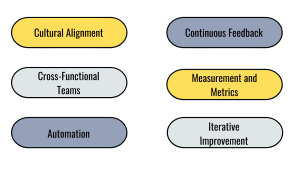Integrating Agile and DevOps for Project Delivery
Introduction In the fast-paced world of software development, two methodologies have emerged as game-changers: Agile and DevOps. While Agile focuses on iterative development a...

Introduction
In the fast-paced world of software development, two methodologies have emerged as game-changers: Agile and DevOps. While Agile focuses on iterative development and customer feedback, DevOps emphasises collaboration, automation, and continuous delivery. While each methodology has its strengths, integrating Agile and DevOps practices can lead to even greater efficiency and effectiveness in project delivery.
Understanding Agile and DevOps
Agile Methodology
Agile methodology revolutionised the software development landscape by introducing a flexible, iterative approach to project management. Instead of rigidly adhering to a predefined plan, Agile teams prioritise delivering small, incremental releases that can quickly adapt to changing requirements and customer feedback. Agile key principles include:
- Iterative Development: Projects are broken down into smaller, manageable tasks or user stories that can be completed in short iterations, typically lasting 1-4 weeks.
- Customer Collaboration: Continuous engagement with stakeholders ensures that the product meets their evolving needs and expectations.
- Adaptability: Agile teams embrace change and welcome feedback throughout the development process, allowing them to make adjustments as needed.
- Self-Organising Teams: Cross-functional teams are empowered to make decisions and adapt their approach to maximise efficiency and productivity.
DevOps Methodology
DevOps extends Agile principles beyond development to encompass the entire software delivery lifecycle, including deployment, operations, and support. It aims to break down silos between development and operations teams, fostering a culture of collaboration, automation, and continuous improvement. DevOps key principles include:
- Collaborative Culture: DevOps promotes shared responsibility and collaboration between development, operations, and other stakeholders involved in the software delivery process.
- Automation: By automating manual tasks such as testing, deployment, and infrastructure provisioning, DevOps teams can streamline processes and accelerate delivery.
- Continuous Integration and Continuous Delivery (CI/CD): CI/CD pipelines enable teams to deliver changes to production quickly and reliably, with automated testing and deployment processes ensuring high quality and stability.
- Feedback Loops: DevOps emphasises the importance of feedback loops at every stage of the delivery process, enabling teams to identify and address issues proactively.
Benefits of Integrating Agile and DevOps
While Agile and DevOps methodologies share common goals, they also complement each other in several ways:
- Faster Time to Market: By combining Agile’s iterative development approach with DevOps’ automation and continuous delivery practices, teams can release new features and updates to customers more frequently and predictably.
- Improved Quality: Agile’s focus on collaboration and feedback, coupled with DevOps’ emphasis on automation and testing, helps ensure that software is thoroughly tested and meets quality standards before deployment.
- Enhanced Collaboration: Integrating Agile and DevOps promotes closer collaboration between development, operations, and other stakeholders, breaking down silos and fostering a culture of shared responsibility and accountability.
- Increased Flexibility: Agile’s iterative approach allows teams to respond quickly to changing requirements and market conditions, while DevOps’ automation capabilities enable rapid deployment and rollback of changes with minimal disruption.
- Continuous Improvement: By embracing Agile’s principle of continuous improvement and DevOps’ focus on automation and feedback loops, organisations can identify bottlenecks, inefficiencies, and areas for improvement more effectively.
Best Practices for Integrating Agile and DevOps

- Cultural Alignment: Successful integration of Agile and DevOps requires a cultural shift towards collaboration, transparency, and shared ownership across teams and departments. Leaders must foster a culture of trust, experimentation, and continuous learning.
- Cross-Functional Teams: Encourage the formation of cross-functional teams that include members with diverse skills and expertise, spanning development, operations, quality assurance, security, and other relevant disciplines. This promotes collective ownership of the entire software delivery lifecycle.
- Automation: Invest in automation tools and infrastructure to streamline development, testing, deployment, and operations processes. Implement CI/CD pipelines to automate build, test, and deployment tasks, enabling teams to deliver changes to production quickly and reliably.
- Continuous Feedback: Establish feedback loops at every stage of the delivery process, soliciting input from customers, stakeholders, and team members to identify issues, gather insights, and drive continuous improvement. Leverage monitoring, logging, and analytics tools to gather actionable feedback from production environments.
- Measurement and Metrics: Define key performance indicators (KPIs) and metrics to track the effectiveness of Agile and DevOps practices, such as cycle time, lead time, deployment frequency, change failure rate, and mean time to recovery (MTTR). Use data-driven insights to identify trends, patterns, and areas for optimization.
- Iterative Improvement: Embrace Agile’s principle of iterative improvement by regularly reflecting on processes, practices, and outcomes, and identifying opportunities for optimization and refinement. Encourage experimentation, risk-taking, and continuous learning to drive innovation and growth.
Conclusion
Integrating Agile and DevOps practices offers numerous benefits for organisations seeking to deliver high-quality software faster and more efficiently. By combining Agile’s iterative development approach with DevOps’ emphasis on collaboration, automation, and continuous delivery, teams can achieve greater flexibility, speed, and reliability in project delivery. By adopting a culture of collaboration, automation, and continuous improvement, organisations can unlock the full potential of Agile and DevOps to drive innovation and deliver value to customers.